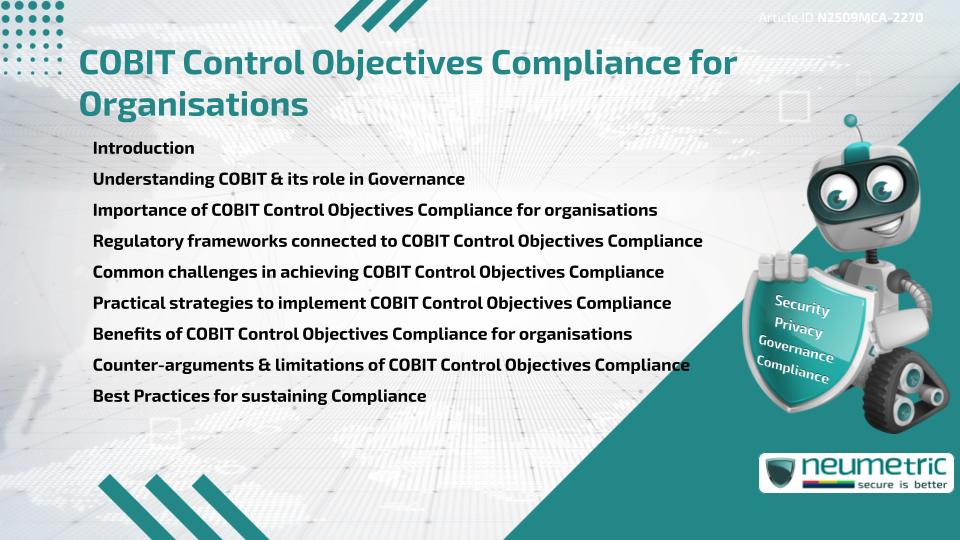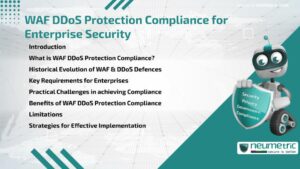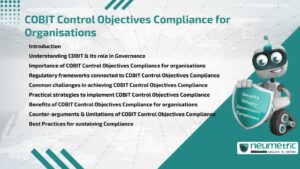Table of Contents
ToggleIntroduction
COBIT Control Objectives Compliance ensures that organisations manage information systems in alignment with Governance & Regulatory Standards. COBIT, short for Control Objectives for Information & Related Technology, provides a Framework for integrating Governance, Risk Management & Compliance with enterprise IT. By meeting these objectives, organisations strengthen Accountability, ensure Data Integrity & support strategic Goals. Without COBIT Control Objectives Compliance, businesses Risk inefficiencies, Regulatory Penalties & weakened Stakeholder Trust.
Understanding COBIT & its role in Governance
COBIT was developed by ISACA as a globally recognised Framework for managing enterprise IT. It helps organisations bridge the gap between Business Goals & Technology by providing principles, practices & objectives for effective Governance.
The Framework is designed to ensure that IT systems contribute to value creation while managing Risks & optimising resources. In this sense, COBIT does not simply address technical controls but places equal emphasis on Policies, Roles & Responsibilities across the enterprise.
Importance of COBIT Control Objectives Compliance for organisations
Compliance with COBIT Control Objectives means more than following a checklist. It reflects an organisation’s commitment to ensuring IT supports overall Governance & Strategy.
For organisations, the benefits of COBIT Control Objectives Compliance include:
- Enhanced Risk Management & Resilience against disruptions.
- Improved alignment between IT & business priorities.
- Stronger Accountability & Transparency for Stakeholders.
- A structured way to meet overlapping Regulatory requirements.
These outcomes build Trust & help organisations demonstrate that they manage information assets responsibly.
Regulatory frameworks connected to COBIT Control Objectives Compliance
COBIT aligns with & supports Compliance efforts across multiple regulations & standards, including:
- General Data Protection Regulation [GDPR]: Ensures lawful processing & protection of Personal Data.
- Health Insurance Portability & Accountability Act [HIPAA]: Mandates protection of Healthcare information.
- Sarbanes-Oxley Act [SOX]: Requires accurate Financial reporting & effective internal controls.
- ISO/IEC 27001: Establishes Best Practices for Information Security management.
By leveraging COBIT, organisations can streamline Compliance efforts across these frameworks, reducing duplication & ensuring consistency.
Common challenges in achieving COBIT Control Objectives Compliance
Despite its advantages, COBIT Control Objectives Compliance can be challenging due to:
- Complexity of implementation: Aligning COBIT with existing systems requires significant planning.
- Resource constraints: Smaller organisations may lack the expertise or budget for full adoption.
- Resistance to change: Staff may see Compliance as a burden rather than a strategic advantage.
- Evolving regulatory landscapes: Organisations must continuously update Compliance efforts as laws & standards change.
These challenges highlight the importance of treating Compliance as a long-term program rather than a one-time project.
Practical strategies to implement COBIT Control Objectives Compliance
Organisations can adopt several strategies to achieve Compliance effectively:
- Conduct a Gap Analysis to identify areas where current practices fall short of COBIT requirements.
- Define roles & responsibilities clearly across IT & business units.
- Integrate COBIT principles into existing Governance frameworks.
- Use automation tools to monitor Compliance & streamline Reporting.
- Provide Training & Awareness programs for staff at all levels.
These steps ensure that COBIT Control Objectives Compliance becomes part of organisational culture.
Benefits of COBIT Control Objectives Compliance for organisations
The advantages of Compliance extend beyond regulatory requirements:
- Operational efficiency: Streamlined processes reduce redundancies & errors.
- Improved decision-making: Reliable data & Governance support better strategic planning.
- Enhanced trust: Stakeholders view the organisation as responsible & transparent.
- Resilience: Strong controls minimise Risks from cyberattacks or operational disruptions.
In essence, COBIT Control Objectives Compliance creates both immediate & long-term value.
Counter-arguments & limitations of COBIT Control Objectives Compliance
Some critics argue that COBIT is overly complex & resource-intensive, especially for smaller organisations. Others note that strict Compliance may encourage a “box-ticking” mentality, where meeting objectives becomes more important than managing Risks effectively.
Additionally, while COBIT provides a strong Framework, it must be tailored to each organisation’s unique context. Failure to customise can lead to inefficiencies or gaps in Governance.
Best Practices for sustaining Compliance
Sustaining COBIT Control Objectives Compliance requires continuous effort. Best Practices include:
- Performing regular Audits & Assessments.
- Updating Control Objectives to match evolving Business & Regulatory needs.
- Aligning COBIT with other Governance models such as ITIL or NIST.
- Establishing a Compliance dashboard for real-time monitoring.
- Encouraging ongoing communication between IT, Compliance teams & executive Leadership.
By embedding these practices into daily operations, organisations can maintain long-term Compliance & reap the associated benefits.
Conclusion
COBIT Control Objectives Compliance is a cornerstone of effective IT Governance. By aligning business & technology goals, it enables organisations to meet Regulatory requirements, reduce Risks & improve Trust. While challenges exist, the benefits of adopting COBIT far outweigh the obstacles when implemented thoughtfully.
Takeaways
- COBIT provides a globally recognised Framework for IT Governance.
- COBIT Control Objectives Compliance ensures alignment with regulations like GDPR, HIPAA & SOX.
- Challenges include complexity, resource needs & resistance to change.
- Compliance builds Efficiency, Resilience & Stakeholder Trust.
- Sustained Compliance requires Audits, Updates & Cultural integration.
FAQ
What is COBIT Control Objectives Compliance?
It is the process of aligning IT Governance with COBIT standards to ensure efficiency, Accountability & Regulatory alignment.
Why is COBIT Control Objectives Compliance important for organisations?
It helps organisations manage Risks, optimise IT resources & demonstrate Accountability to Stakeholders & Regulators.
Which regulations align with COBIT Compliance?
Regulations like GDPR, HIPAA, SOX & ISO/IEC 27001 align closely with COBIT Control Objectives Compliance efforts.
Is COBIT Compliance mandatory?
COBIT itself is not a law, but following its objectives helps organisations meet legal & regulatory requirements.
What challenges do organisations face in COBIT Compliance?
Challenges include complexity, resource limitations, staff resistance & evolving regulations.
How can organisations implement COBIT Compliance effectively?
By conducting gap analyses, defining roles, integrating with existing Governance & training Employees.
Does COBIT Compliance benefit only large organisations?
No, small & mid-sized organisations also benefit, though they may need to adapt the Framework to their scale.
Need help for Security, Privacy, Governance & VAPT?
Neumetric provides organisations the necessary help to achieve their Cybersecurity, Compliance, Governance, Privacy, Certifications & Pentesting needs.
Organisations & Businesses, specifically those which provide SaaS & AI Solutions in the Fintech, BFSI & other regulated sectors, usually need a Cybersecurity Partner for meeting & maintaining the ongoing Security & Privacy needs & requirements of their Enterprise Clients & Privacy conscious Customers.
SOC 2, ISO 27001, ISO 42001, NIST, HIPAA, HECVAT, EU GDPR are some of the Frameworks that are served by Fusion – a SaaS, multimodular, multitenant, centralised, automated, Cybersecurity & Compliance Management system.
Neumetric also provides Expert Services for technical security which covers VAPT for Web Applications, APIs, iOS & Android Mobile Apps, Security Testing for AWS & other Cloud Environments & Cloud Infrastructure & other similar scopes.
Reach out to us by Email or filling out the Contact Form…





